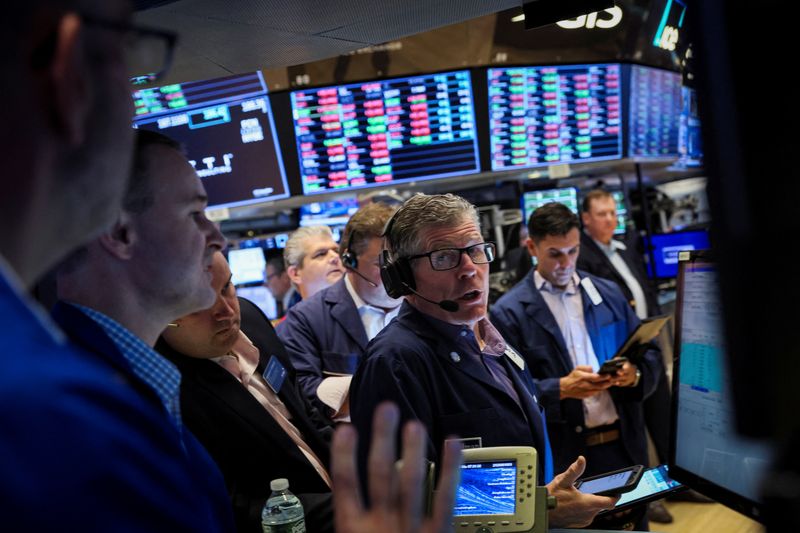By Saqib Iqbal Ahmed
NEW YORK (Reuters) - Some traders took advantage of Tuesday's massive selloff in the U.S. stock market to go bottom fishing in stocks and options in hopes of picking up cheap upside bets on a quick market rebound.
With S&P 500 dropping 4.3% on Tuesday, the Cboe Volatility Index - the so-called Wall Street "fear gauge" - jumped to a two-month high, as traders lapped up defensive put options, pointing to heightened fear of the stock market revisiting its mid-June lows.
Others, however, decided to pick up dimes in front of the proverbial bulldozer as markets sold off, though expectations of a more aggressive Federal Reserve have dampened hopes of a significant market rebound anytime soon.
For the S&P 500 Index-tracking SPDR S&P 500 ETF Trust (ASX:SPY), six of the top 20 most actively traded contracts on Tuesday were call options, according to Trade Alert data.
These ranged from calls betting on the SPY shares rebounding to $380 to those looking for a move up to $405 by the end of Wednesday's session. On Wednesday, with SPY shares about flat on the day at around $393, the trend continued with 0.7 SPY calls traded for every put.
More broadly, a pick up in implied volatility - an options market measure of the expected move in prices - for calls in SPY and the Nasdaq-100 Index-tracking Invesco QQQ Trust, pointed to some traders starting to initiate bullish trades, said Matthew Tym, head of equity derivatives trading at Cantor Fitzgerald.
"With the market down 4% they were probably looking for some upside ... so you have probably retail (traders) coming in and lifting some of those upside calls," Tym said.
The sudden drop in the market may have also forced options dealers to snap up call options as a way to balance the increased risk to their own books, he said
Betting on a quick rebound was not restricted to the options market, with retail investors buying $2 billion worth of U.S.-listed securities, the second largest day of retail net flows this year, according to Vanda (NASDAQ:VNDA) Research.
"However, this strong showing by mom-and-pop traders failed to support broad indices as selling pressure from professional investors was overwhelming," the firm's analysts wrote.

Meanwhile, SPY & NASDAQ 100 index skew - an options market measure of the relative demand for puts versus calls - remains muted, suggesting little fear of an extreme drop in the market, according to Christopher Jacobson, a strategist at Susquehanna Financial Group.
While the recent sharp selloff and continued risks posed by inflation may suggest skew should be more elevated, the fact that the market has sold off in fits and starts, rather than all at once, may be helping keep fear of a stock market crash muted, Jacobson said in a note.